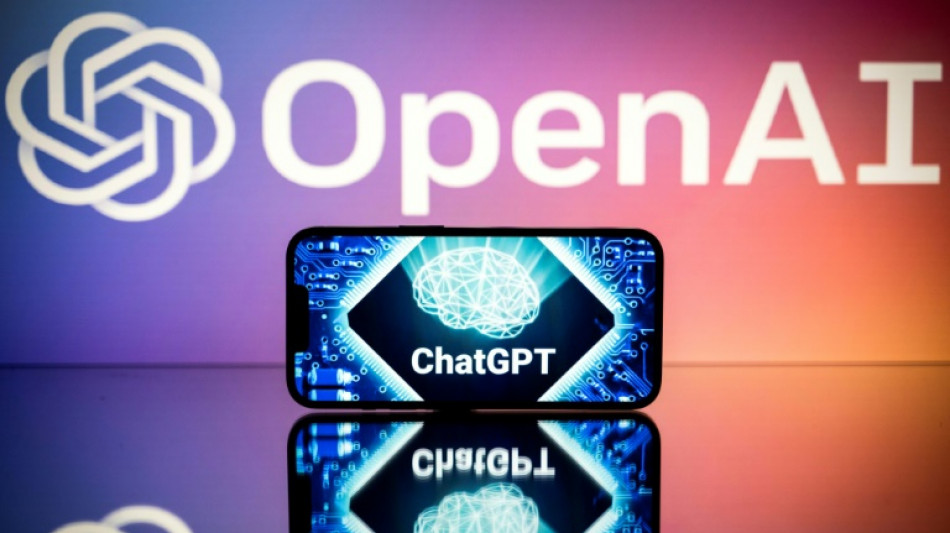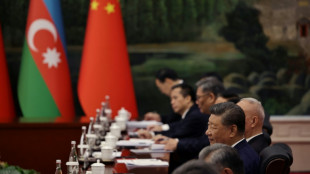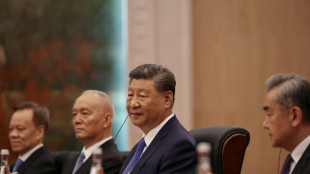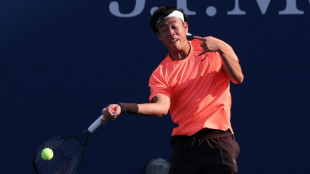
-
 Israel says killed spokesman for Hamas armed wing
Israel says killed spokesman for Hamas armed wing
-
Ireland on verge of Women's Rugby World Cup quarter-finals after seeing off stubborn Spain

-
 Vardy set to complete move to Serie A side Cremonese: source
Vardy set to complete move to Serie A side Cremonese: source
-
Japan's Yamaguchi cruises to third badminton world title

-
 Jackson hopes to revive Bayern move after Chelsea halt loan deal
Jackson hopes to revive Bayern move after Chelsea halt loan deal
-
Floods leave women struggling in Pakistan's relief camps

-
 Augsburg's Fellhauer leaves hospital after concussion against Bayern
Augsburg's Fellhauer leaves hospital after concussion against Bayern
-
Man Utd stars back Amorim says De Ligt

-
 Indonesia leader says some protests 'leaning towards treason, terrorism'
Indonesia leader says some protests 'leaning towards treason, terrorism'
-
Springboks call up De Klerk for New Zealand tour

-
 Indonesian finance minister's home looted as protest anger grows
Indonesian finance minister's home looted as protest anger grows
-
Indonesia protests put spotlight on paramilitary police force

-
 Putin and Modi in China for summit hosted by Xi
Putin and Modi in China for summit hosted by Xi
-
Britain's energy grid bets on flywheels to keep the lights on

-
 Wife of Australian man wanted in police killings urges him to surrender
Wife of Australian man wanted in police killings urges him to surrender
-
Indonesian islanders taking Swiss concrete giant to court over climate

-
 Zverev knocked out in US Open third round
Zverev knocked out in US Open third round
-
Aid flotilla with Greta Thunberg set to sail for Gaza

-
 French foreign minister expresses 'solidarity' on Greenland trip
French foreign minister expresses 'solidarity' on Greenland trip
-
Tourists dice with danger on Hanoi's train street

-
 Pacifist Japan struggles to boost troops as China anxiety grows
Pacifist Japan struggles to boost troops as China anxiety grows
-
In Guyana, remote dirt road seen as future economic lifeline

-
 Putin lands in Tianjin for summit hosted by China
Putin lands in Tianjin for summit hosted by China
-
Sinner, Swiatek tested at US Open as Gauff sets up Osaka showdown

-
 Swiatek struggles into US Open fourth round
Swiatek struggles into US Open fourth round
-
Olympic champion Hassan and Kiros smash course records to win Sydney Marathon

-
 New wave: Sea power turned into energy at Los Angeles port
New wave: Sea power turned into energy at Los Angeles port
-
China's Wang grabs three-shot LPGA lead at TPC Boston

-
 Hassan and Kiros smash race records to win Sydney Marathon
Hassan and Kiros smash race records to win Sydney Marathon
-
Mitchell wants more from England at World Cup after another huge win

-
 Real Madrid overturn Mallorca as Atletico held
Real Madrid overturn Mallorca as Atletico held
-
Sinner tested at US Open as Gauff cruises into last 16

-
 Joao Neves bags stunning hat-trick as PSG put six past Toulouse
Joao Neves bags stunning hat-trick as PSG put six past Toulouse
-
Real Madrid make Mallorca comeback to maintain perfect start

-
 Wong's US Open dream over after Rublev thriller
Wong's US Open dream over after Rublev thriller
-
Last-gasp Anguissa fires Napoli past Cagliari, Roma keep pace

-
 Sinner repels Shapovalov to reach US Open last 16
Sinner repels Shapovalov to reach US Open last 16
-
In Argentina, the tango keeps Parkinson's symptoms at bay

-
 Shi sets up badminton world final with Kunlavut, women's champion An falls
Shi sets up badminton world final with Kunlavut, women's champion An falls
-
Igamane hits debut double for seven-goal Lille

-
 Del Toro delivers his monster, 'Frankenstein', at Venice
Del Toro delivers his monster, 'Frankenstein', at Venice
-
Osaka sinks Kasatkina to reach US Open last 16

-
 Bayern survive late Augsburg scare, Ten Hag's tough start continues
Bayern survive late Augsburg scare, Ten Hag's tough start continues
-
NFL Cowboys linebacker legend Jordan dead at 84

-
 Lamlioui double fires Morocco to record third CHAN title
Lamlioui double fires Morocco to record third CHAN title
-
Chelsea sign Garnacho from Man Utd

-
 Spurs fans right to boo after Bournemouth defeat: Frank
Spurs fans right to boo after Bournemouth defeat: Frank
-
Gauff cruises at US Open as Sinner targets last 16

-
 Simeone's stuttering Atletico draw at Alaves
Simeone's stuttering Atletico draw at Alaves
-
Smiling Gauff romps into US Open last 16


How AI could upend the world even more than electricity or the internet
The rise of artificial general intelligence -- now seen as inevitable in Silicon Valley -- will bring change that is "orders of magnitude" greater than anything the world has yet seen, observers say. But are we ready?
AGI -- defined as artificial intelligence with human cognitive abilities, as opposed to more narrow artificial intelligence, such as the headline-grabbing ChatGPT -- could free people from menial tasks and usher in a new era of creativity.
But such a historic paradigm shift could also threaten jobs and raise insurmountable social issues, experts warn.
Previous technological advances from electricity to the internet ignited powerful social change, says Siqi Chen, chief executive of San Francisco startup Runway.
"But what we're looking at now is intelligence itself... This is the first time we're able to create intelligence itself and increase its amount in the universe," he told AFP.
Change, as a result, will be "orders of magnitude greater than every other technological change we've ever had in history."
And such an exciting, frightening shift is a "double-edged sword," Chen said, envisioning using AGI to tackle climate change, for example, but also warning that it is a tool that we want to be as "steerable as possible."
It was the release of ChatGPT late last year that brought the long dreamt of idea of AGI one giant leap closer to reality.
OpenAI, the company behind the generative software that churns out essays, poems and computing code on command, this week released an even more powerful version of the tech that operates it -- GPT-4.
It says the technology will not only be able to process text but also images, and produce more complex content such as legal complaints or video games.
As such it "exhibits human-level performance" on some benchmarks, the company said.
- Goodbye to 'drudgery' -
The success of OpenAI, backed by Microsoft, has ignited an arms race of sorts in Silicon Valley as tech giants seek to push their generative AI tools to the next level -- though they remain wary of chatbots going off the rails.
Already, AI-infused digital assistants from Microsoft and Google can summarize meetings, draft emails, create websites, craft ad campaigns and more -- giving us a glimpse of what AGI will be capable of in the future.
"We spend too much time consumed by the drudgery," said Jared Spataro, Microsoft corporate vice president.
With artificial intelligence Spataro wants to "rediscover the soul of work," he said during a Microsoft presentation on Thursday.
Artificial intelligence can also cut costs, some suggest.
British landscape architect Joe Perkins tweeted that he used GPT-4 for a coding project, which a "very good" developer had told him would cost 5,000 pounds ($6,000) and take two weeks.
"GPT-4 delivered the same in 3 hours, for $0.11," he tweeted. "Genuinely mind boggling."
But that raises the question of the threat to human jobs, with entrepreneur Chen acknowledging that the technology could one day build a startup like his -- or an even better version.
"How am I going to make a living and not be homeless?" he asked, adding that he was counting on solutions to emerge.
- Existential questions -
Ubiquitous artificial intelligence also puts a question mark over creative authenticity as songs, images, art and more are cranked out by software instead of people.
Will humans shun education, relying instead on software to do the thinking for them?
And, who is to be trusted to make the AI unbiased, accurate, and adaptable to different countries and cultures?
AGI is "probably coming at us faster than we can process," says Sharon Zhou, co-founder of a generative AI company.
The technology raises an existential question for humanity, she told AFP.
"If there is going to be something more powerful than us and more intelligent than us, what does that mean for us?" Zhou asked.
"And do we harness it? Or does it harness us?"
OpenAI says it plans to build AGI gradually with the aim of benefitting all of humanity, but it has conceded that the software has safety flaws.
Safety is a "process," OpenAI chief scientist Ilya Sutskever said in an interview with the MIT Technology Review, adding that it would be "highly desirable" for companies to "come up with some kind of process that allows for slower releases of models with these completely unprecedented capabilities."
But for now, says Zhou, slowing down is just not part of the ethos.
"The power is concentrated around those who can build this stuff. And they make the decisions around this, and they are inclined to move fast," she says.
The international order itself could be at stake, she suggests.
"The pressure between US and China has been immense," Zhou says, adding that the artificial intelligence race invokes the Cold War era.
"There is definitely the risk with AGI that if one country figures that out faster, will they dominate?" she asks.
"And so I think the fear is, don't stop because we can't lose."
L.Janezki--BTB


